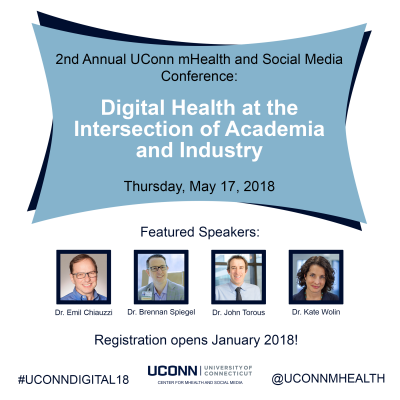PAST CONFERENCES
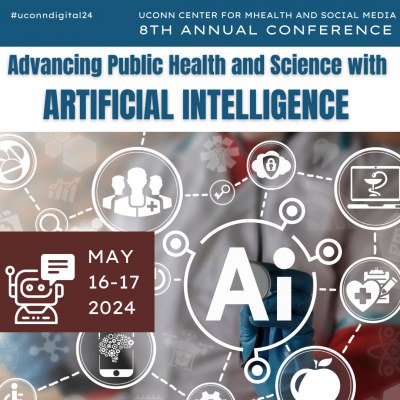
8th Annual Virtual Conference: Advancing Public Health and Science with Artificial Intelligence
May 16-17, 2024
Artificial intelligence, including machine learning, natural language processing, rule-based expert systems, robots, chatbots, and robotic process automation, is being rapidly applied in healthcare settings to enhance efficiency and quality of care. In late 2022, generative artificial intelligence (genAI) tools exploded onto the scene unleashing myriad uses in health, science, and academia. This conference will feature keynote speakers and panelists who are leaders in the use of AI to solve health problems and/or advance scientific scholarship. Novel applications, ethical issues, and best practices will be discussed, as well as implications for training the next generation of healthcare professionals and scientists. Whether you are brand new to AI or a seasoned expert, this conference program is designed to stimulate innovative ideas and applications for the ethical use of AI in health and science. Save the date! May 16-17, 2024!
Missed a session? Want to hear what our stellar speakers had to share about AI?
Recordings of the conference are now available to all paid registrants. If you are a paid registrant and have not received the recordings, you can contact the Center coordinators at mhealthcenter@uconn.edu.
If you did not attend the conference and are interested in viewing the content, you can purchase recordings of the 2024 conference here: https://mhealth.inchip.uconn.edu/conference-recordings
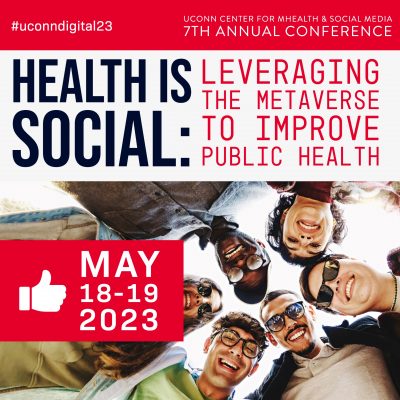
7th Annual Virtual Conference: Health is Social: Leveraging the Metaverse to Improve Public Health
May 18-19, 2023
The theme of the 2023 annual virtual CHASM conference was “Health is Social: Leveraging the Metaverse to Improve Public Health.” A theme throughout the conference was the role of social connectedness in health and ways we can leverage the metaverse to strengthen social ties, social support, and tilt social norms toward healthy choices, healthy lifestyles, and healthy communities. This conference featured keynote speakers and panelists who are studying and innovating tools of the metaverse, including social media, virtual reality, and digital technologies to help us connect in ways that solve health problems.
Keynotes
Health Promotion in the Era of Social Media: the Case Study of Vaccines
Lorien Abroms, ScD, MA, Professor, Department of Prevention and Community Health; Associate Dean for Ph.D. & MS Studies, Milken Institute School of Public Health, George Washington University
Beyond the ‘Like’: Building Trust in the Social Media Era
Aleksandra Kuzmanovic, Leadership Social Media Manager at the World Health Organization
Health is Social: The Long Term Health Effects of Social Isolation and Loneliness
Julianne Holt-Lunstad, PhD, Professor of Psychology and Neuroscience, Brigham Young University
Virtual Reality-Based Digital Therapeutics: The past, present, and future
Risa Weisberg, PhD, Chief Clinical Officer, BehaVR; Professor of Psychiatry, Boston University School of Medicine
Panel: How Can Public Health Better Utilize Social Media? Challenges and Opportunities
Y. Alicia Hong, PhD, George Mason University
David Buller, PhD, Klein Buendel, Inc
Eleni Linos MD, MPH, DrPH, Stanford University
A Panel Discussion with Moderators of Large Health-Focused Facebook Groups
Anna Williams; Patient Advocate, Moderator of the Trigeminal Neuralgia Support Facebook Group
Lori Cooney, M.Ed; Program Director, Institute of Community Inclusion, UMass Boston; Moderator of the Eosinophilic Family Support Network Facebook Group
Mary Van Doorn; Coach, Patient Advocate, and Founder, Sugar Momma Strong Diabetes Support Facebook Group
Conference attendees had the option to attend two 90-minute workshops. Managing Engagement Data from Facebook Delivered Interventions, given by Joe DiVito, Christie Idiong, MS and Richard Bannor, MPH and How to Use Facebook to Deliver a Health Promotion Intervention given by Natalie Luders, MPH and Sherry Pagoto, PhD.
The Conference also featured six oral paper presentations and 57 video posters. Attendees viewed the two-minute video posters in informal breakout discussions with the poster authors in breakout sessions. Awards were selected by our panel of judges: Lindsay Palmer, PhD; Jocelyn Steinke, PhD; Saras Bellur, PhD; and Jiyoun Suk, PhD.
Best Video Posters
Callie Ogland-Hand, MA, Center for Environmental Health, Case Western Reserve University, School of Medicine
FM Engage: Designing a digital health app to facilitate farmers market use among SNAP parents
Hannah P Schneider, Department of Health Behavior and Health Education, School of Public Health, University of Michigan, Ann Arbor, Michigan
Injury Risk Challenges on TikTok: The New Best Place for Dumb Ideas
Anna Young, MS, Student Health and Wellness, University of Connecticut
How does active and passive health information consumption impact intentions of pro-health behaviors? The role of engagement and cognitive elaboration.
Most Viewed Video Posters
Jose Miguel Diniz, Department of Community Medicine, Information and Health Decision Sciences, Faculty of Medicine, University of Porto, Porto, Portugal
Health Data Privacy with Decentralized Learning: A Systematic Review Protocol
Kamal Gautam, Department of Allied Health Sciences, University of Connecticut, Storrs, CT, USA
Usability and Acceptability of the Chemsex Prevention Package (“PartyPack”): mHealth-Delivered Sexual Harm Reduction Tool for Men Who Have Sex with Men in Malaysia
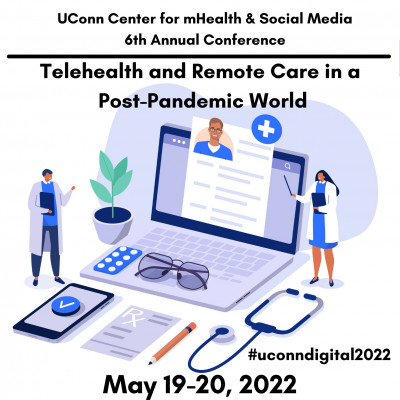
6th Annual Virtual Conference: Telehealth and Remote Care in a Post-Pandemic World
May 19-20, 2022
The theme of the 2022 annual CHASM conference was “Telehealth and Remote Care in a Post-Pandemic World.” Telehealth utilization grew by 78 fold during the pandemic as the need for safe means to access and deliver healthcare was greater than ever. This rapid expansion of telehealth was enabled by regulatory changes, some temporary and some permanent, which expanded reimbursement for telehealth-delivered care. Given that patient and provider willingness to use telehealth and the skills to do so have increased, a roadmap is now needed for virtual care models that serve the goals of improving access to care, outcomes, and affordability.
This conference featured keynote speakers and panelists who are studying and innovating virtual care models in medicine, mental health, physical therapy, pediatrics, underserved populations, and beyond. Topics including health equity, asynchronous interventions and care, and telehealth and the patient experience were discussed and debated.
Todd Norwood, DPT, Omada Health
Kristin Ray, MD, University of Pittsburgh School of Medicine
Courtney Lyles, PhD, University of California, San Francisco
Jared Skillings, PhD, ABPP, American Psychological Association
Panel: Optimizing Telehealth Patient Experience
Keren Ladin, PhD, MSc, Tufts University
Jenny Lin, MD, MPH, Icahn School of Medicine at Mount Sinai
Rachel Talley, MD, University of Pennsylvania
Panel: Asynchronously Delivered Telehealth: Advantages, Challenges, and Opportunities
Peter Yellowlees, MBBS, MD, University of California, Davis Health
Jingwen Zhang, PhD, University of California, Davis
Geoff Matous, Wellinks
The Conference also featured six oral paper presentations and 57 video posters. Attendees viewed the two-minute video posters in informal breakout discussions with the poster authors over Zoom. All abstract authors received an invitation to publish their abstract at no cost in a special issue of JMIR Iproceedings as well as a 20% discount on the publication fee for full manuscripts submitted to JMIR mHealth and uHealth resulting from an Iproceedings abstract. Four video poster authors and attendees were selected to receive awards; each recipient received a 20% discount on the publication fee for an additional paper submitted to any JMIR journal. For being the first to complete the UConnDigital Workout Bingo, an attendee received an Aria scale.
Best Paper
Christina McGinnis, BS, MBS, Weill Cornell Medicine, Can hybrid in-person and virtual care delivery models increase access to vulnerable populations in the post-COVID-19 era?
Best Student Video
Ashlie Delskey, Pari Patel, Wu, C., Cleffi, C., Amonkar, A., Bhat, A., Srinivasan, S., University of Connecticut, Is telehealth a feasible mode of intervention delivery to improve social communication skills in children with Autism Spectrum Disorder? Results from a pilot randomized controlled trial.
https://youtu.be/Ywsf_kdJ0Ak
Best Non-Student Video
Sun-Kyung Lee, PhD, Qiyue Cai, MA, Sydni Basha, BS, Aditi Gupta, MA, Abigail Gewirtz, PhD Arizona State University, A technology-based intervention to help healthcare provider parents manage stress during COVID-19: Findings from a pilot micro-randomized trial.
https://youtu.be/pz6gggiLn6w
Most Viewed Video
Diogo Nogueira-Leite, M.Sc. & Ricardo Cruz-Correia, PhD, University of Porto, Porto, Portugal, Protocol for research project on physicians’ & individuals’ attitudes of digital mental health tools.
https://youtu.be/TzN1EjQTkgQ
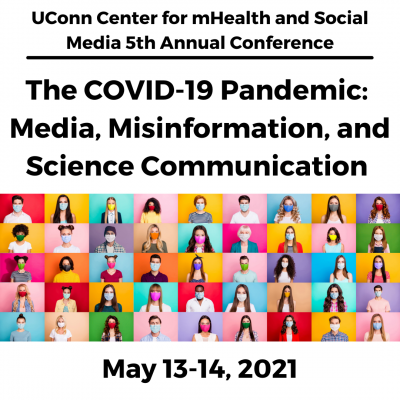
5th Annual Virtual Conference: The COVID-19 Pandemic: Media, Misinformation, and Science Communication
May 13-14, 2021
The theme of the 2021 annual CHASM conference was “The COVID-19 Pandemic: Media, Misinformation, and Science Communication.” The COVID-19 pandemic has made it abundantly clear how misinformation on the internet can have dire public health consequences and the important role scientists have in communicating to the public. At this two-day conference, discussions included a focus on how scientists, clinicians, public health professionals, and patients can work together to counteract the infodemic.
Nationally renowned keynote speakers and panelists shared their work examining online COVID-19 patient communities, vaccine hesitancy and acceptance, health inequities and global health communication.
Natalie Lambert, PhD. Indiana University
Allison Buttenheim, PhD, MBA, University of Pennsylvania
Wizdom Powell, PhD, UConn Health
Scott Ratzan, MD, MPA, City University of New York
Monica Wang, PhD, Boston University
Jessica Gold, MD, MS, Washington University in St. Louis
Eleanor Murray, ScD, Boston University
Eugenia South, MD, MSHP, University of Pennsylvania
Natalie Shook, PhD, University of Connecticut
Jasmin Tiro, PhD, University of Texas
We accepted abstracts for formal paper sessions and video paper sessions. We featured 6 oral paper presentations and 34 video posters. Attendees viewed these 2-minute video posters at their leisure and participated in informal breakout discussions with the poster authors over zoom. We selected a number of video poster authors and attendees to receive awards. The awards came with 500 JMIR Karma credits or an invitation to publish in the JMIR network of journals.
JMIR Infodemiology Editor’s Picks
Zoya Adeel, McMaster University, Press Before Peer Review: Tracking Media Coverage of COVID-19 Science. https://youtu.be/ZF419hOCrro
Christie Idiong and Richard Bannor, University of Connecticut, A Qualitative Analysis of the Disinformation Dozen on Twitter and Prevalent Themes Surrounding COVID-19 and Vaccine-Related Disinformation. https://youtu.be/cZT1hUEGlfc
Best Student Video
Samuel Mendez, Harvard University, Lessons Learned from Rapid COVID-19 Health Communication with Community Health Centers in Massachusetts. https://youtu.be/R5sfg-TcZ40
Best Videos
Molly Waring, University of Connecticut, Factors Associated with COVID-19 Vaccine Hesitancy among Mothers of Children 0-12 Years Old. https://youtu.be/8y0twaYJcBQ
Arcana Krishnan, University of Albany (SUNY), Documenting Disparities in Technology Access, Information-Seeking and Vaccine Hesitancy during the COVID-19 Pandemic in New York’s Capital Region. https://youtu.be/66gA_kJjN-c
Most Viewed Video
Mayank Sakhuja, University of South Carolina, Communicating online with patients during a pandemic: An analysis of Covid-19 information on outpatient clinic websites. https://youtu.be/GW5NlBqhqBk
Most Engaged Conference Attendee
Anne Oeldorf-Hirsch, University of Connecticut
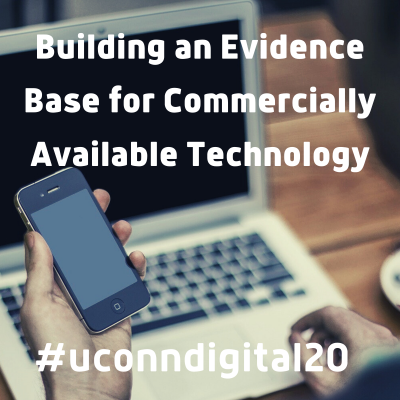
2020 Virtual Conference: Building an Evidence Base for Commercially Available Technology
Speakers: Brie Turner-McGrievy, PhD,University of South Carolina; Yelena Wu, PhD, University of Utah; Heather Patrick, PhD, Private Sector; David Conroy, PhD, Pennsylvania State University; Aaron Coleman, CEO of Fitabase; Jennifer Huberty, PhD, Arizona State University
When: May 14-15, 2020
Description: The UConn Center for mHealth and Social Media (CHASM) 2020 Annual Conference was 100% virtual. The theme of the 2020 annual CHASM conference is “Building an Evidence Base for Commercially Available Technology,” and focused on research that evaluates the reliability, accuracy, efficacy, or real world effectiveness of commercially available technology including mobile apps, sensors, devices, or social media platforms. Digital health is a $200 billion industry with countless apps, devices, platforms and sensors available in the marketplace and in the hands of millions of users. This marketplace offers myriad opportunities for research aiming to improve health outcomes. Evidence is direly needed for commercially available technologies to guide healthcare professionals on which products to “prescribe” to their patients, and to guide consumers on which products are worth their time and money.
We designed the program to catalyze research on commercial health technologies and to lay out a roadmap for best practices, including how to navigate the myriad methodological, logistical, and ethical challenges of research using commercial health technologies. We featured nationally renowned keynote speakers from academia and industry who have expertise in using commercially available health technologies in research. Attendees had the opportunity to participate in virtual breakout sessions to give them closer access to speakers for advice on anything from developing relationships with industry to innovative research designs. Attendees were also strongly encouraged to come ready to develop a research question during the conference and submit seed grant proposals to two funding opportunities that opened shortly after the conference. Three workshops were held on Friday, May 15: Research Designs for Testing Commercially Available Technology, How To Write an Effective Seed Grant, and Introduction to Social Network Analysis.
Video Poster Abstracts: In lieu of a traditional poster session, we hosted a video poster session. Instead of a traditional poster, presenters produced a 1 minute video summarizing their research in any way they saw fit. Awards were given to the video with the most views and to those selected by our judges for Best Video Poster by a Student and Best Video Poster Overall. You can enjoy video posters on our YouTube playlist.
Seed Grants for Conference Attendees: Two funding opportunities are available exclusively to registered conference attendees. One opportunity is open to all attendees and one is reserved for PIs from UConn. The company Calm is kindly sponsoring one funding opportunity for any attendees interested in using Calm in their research. CHASM and UConn’s InCHIP are co-sponsoring the seed grant opportunity reserved for UConn investigators. See more information and submission details here.
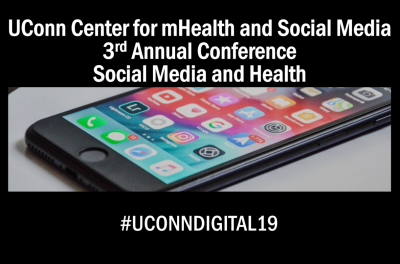
3rd Annual UConn Center for mHealth and Social Media Conference
“Social Media and Health”
Date: 5/16/19
Location: Student Union Ballroom, 2110 Hillside Road, U-3008. Storrs, CT 06269-3008
Speakers: Drs. David Cavallo (Case Western Reserve University), Michael Amato (Truth Initiative), Christopher Carroll (Connecticut Children’s Medical Center), Sherry Emery (NORC at University of Chicago), Cesar Gabriel Escobar-Viera (University of Pittsburgh), Philip Massey (Drexel University), and Anne Oeldorf-Hirsch (University of Connecticut)
2nd Annual UConn Center for mHealth and Social Media Conference: Digital Health At the Intersection of Academia and Industry
Date: 5/17/18
Location: Rome Commons Ballroom, University of Connecticut, 626 Gilbert Road Ext., Storrs, CT 06269
Time: 9:00 am – 5 pm
Presented by: UConn Center for mHealth and Social Media
Speakers: Dr. John Torous, Co-Director of the Digital Psychiatry Program, Beth Israel Deaconess Medical Center; Dr. Kate Wolin, Chief Science Officer, Interactive Health; Dr. Emil Chiauzzi, Clinical Research Psychologist, Principal Scientist, PatientsLikeMe; Dr. Brennan Spiegel, Director of Health Services Research, Cedars-Sinai Health System
Details: The UConn Center for mHealth and Social Media is pleased to present its 2nd Annual Conference with the theme of Digital Health at the Intersection of Academia and Industry. The conference will be held at the University of Connecticut in Storrs, CT from 9:00 am – 5:00 pm on May 17, 2018. Speakers from Cedars-Sinai, Beth Israel Deaconess Medical Center, PatientsLikeMe, and Interactive Health will be presenting state-of-the-art research on mobile apps, devices, wearables, and social media. A panel will discuss the topic of building interdisciplinary and academia-industry collaborations. A poster session and wine reception will be held at 4:00 pm. See full agenda.
Submit Abstract (by 3/19/18): https://www.regonline.com/builder/site/tab1.aspx?EventID=2118387
Registration ($40/free for UConn students): https://www.regonline.com/builder/site/default.aspx?EventID=2118387
View post Conference images and information!
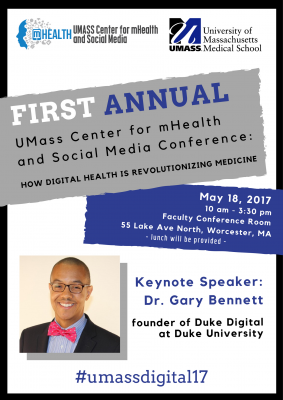
First Annual UMass Center for mHealth and Social Media Conference: How Digital Health is Revolutionizing Medicine
Date: 5/18/17
Location: Faculty Conference Room, Medical School, 55 Lake Ave North, Worcester, MA
Time: 10am – 3:30pm
Presented by: UMass Center for mHealth and Social Media
Keynote Speaker: Dr. Gary Bennett, Duke University
